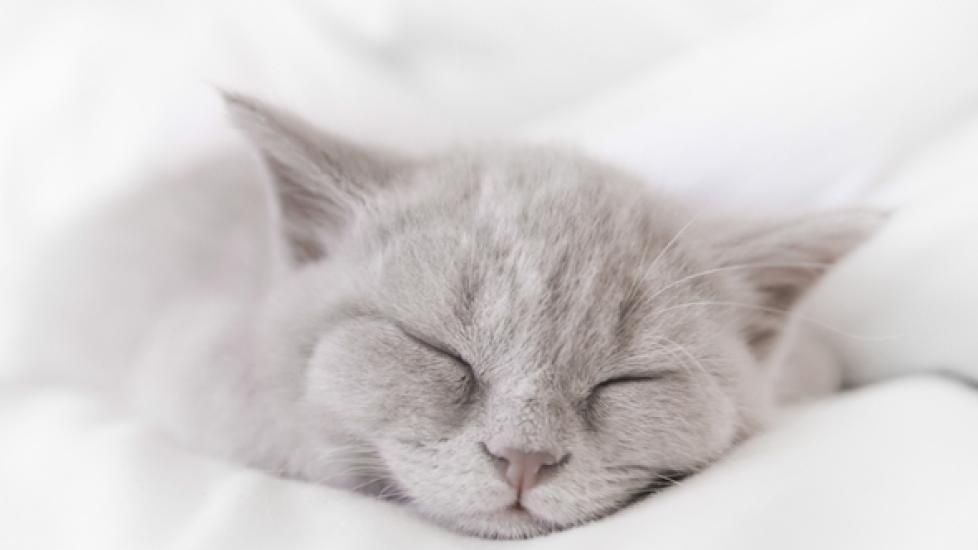Do Cats Snore?
When you brought a new kitty home, you probably expected the typical cat experience: lots of sleeping. When she settled in for a nap, you might not expect the super-loud—but still probably pretty cute—snores coming from her little nose as she slept.
Snoring in cats is less common than it is in dogs, which may leave cat parents wondering if there’s a major issue with their feline companions. While snoring could be indicative of a larger health issue, a cat who snores is not necessarily in medical trouble.
If you’re wondering whether you need to schedule an appointment with your vet, here’s what you should know about cat snoring.
Why Does My Cat Snore?
There are all sorts of reasons why a cat snores. Here are some of the most common.
Anatomy
Certain breeds—namely the ones with flattened facial features, like Persians—are much more likely to snore due to the shape of their heads.
“These brachycephalic cats have shortened bones in their face and nose, which makes them more prone to snoring,” explains Dr. Bruce Kornreich, associate director of the Cornell Feline Health Center and cardiologist at the Cornell University College of Veterinary Medicine’s Department of Clinical Sciences. “They also may have smaller nostrils that restrict breathing.”
And it’s not just their flat face and narrow nostrils—brachycephalic cats may have other physical features that cause snoring, such as an elongated soft palate that could partially block the entrance to the windpipe. This makes it more difficult for air to pass through and could lead to cats making strange noises when they breathe.
Sleeping Positions
Like with people, certain cat sleeping positions precipitate snoring. So, if your cat shifts around and all of a sudden lets out a loud snore, it could just be that she’s angled her head and neck in a way that restricts airflow and causes her to sputter.
Medical Conditions
Snoring could also be related to existing medical conditions. “If you have a cat that suffers from upper respiratory infections or chronic nasal inflammation or rhinitis, it’s likely that cat will be a snorer,” says Dr. Andrea Jones, a veterinarian at the New Jersey-based Princeton Animal Hospital & Carnegie Cat Clinic.
Another cause may be blockages in the nasal canal, such as polyps or tumors. Even foreign objects stuck in the nasal cavity, like a blade of grass, can cause snoring.
Overweight cats are also more likely to snore because excess fat can occur in the tissues surrounding the upper airway, including the back of the throat and neck.
Signs You Should Take Your Snoring Cat to the Vet
If your cat has always snored, she’s probably OK. However, if the snoring comes on suddenly or is accompanied by other changes in behavior, it’s time to call the vet.
Beyond a rapid onset of snoring, owners should also be wary of symptoms of distressed breathing while the cat is awake. This includes:
-
Wheezing
-
Open-mouth breathing
Kornreich says cat parents should look out for signs like nasal discharge and coughing, which may be signs of a more serious problem. Even symptoms that might not seem like symptoms—like a change in meow—could signify a problem. “Cats don’t tend to show signs of illness until they’re very sick, so you really need to be vigilant,” he says.
Jones agrees, adding that pet parents with snoring cats should also keep an eye out for swollen areas on the face. “This could indicate a tooth root abscess, which can be very painful and needs medical intervention,” she says.
How To Treat Snoring in Cats
Depending on the reason for the snoring, there are some ways you can help your cat stop. If polyps, a tumor, or foreign objects are to blame, your vet can remove them.
Losing weight can also help some cats stop snoring. “Lots of cats are overweight, so that is a big factor to consider,” Jones says. So, make sure that Kitty isn’t overeating and is getting enough exercise.
There are also non-medical solutions. For example, consider putting a humidifier near where your cat likes to doze. Very dry air can have the same effect on cats as it does on people, and adding a little moisture to the surroundings may be beneficial in achieving a quiet night’s rest.
Overall, if your cat is playful, happy, has a healthy appetite, and her snoring isn’t anything new, try not to be too concerned. It may just be another one of her quirks.
By Kate Hughes
Featured Image: Adobe/merkulovstudio
